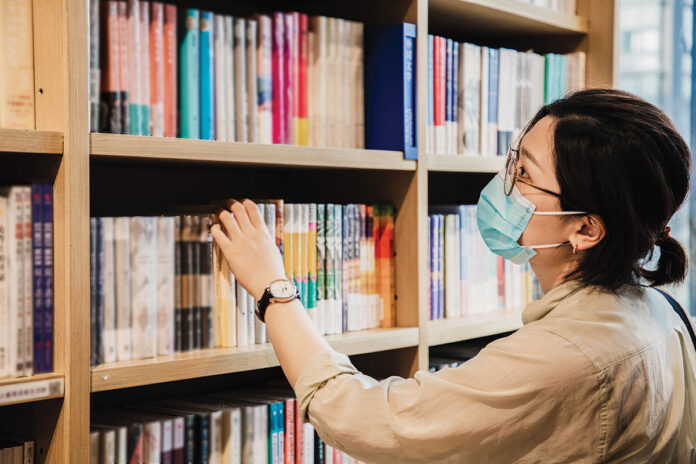With government agencies opening back up to the public, National City Library Academic Enrichment Programs Coordinator Mikki Vidamo, who works with literacy programs at the library, offered a glimpse into what programming will look like as in-person events return and the best parts of virtual programs are honed down for keeping.
“Speaking for literacy, specifically, we’re going to be able to offer face to face and online interaction. One thing that was really great about going virtual was our ability to extend our service hours, things like being able to offer tutoring whenever a volunteer tutor was available to help a student online. In other parts of the library, we saw a similar thing: the accessibility level went up, especially for kids who we could reach at home through Zoom while parents had to work,” Vidamo said.
Website hits that were tracked the whole time the library was closed, Vidamo said, show online use went up exponentially. However, the need for technology in the community became abundantly clear as staff realized many residents rely on their cellular phones to access the internet, and don’t actually have a computer or reliable wi-fi. With that realization, library staff applied for grant money from the city and can now offer a laptop, a hotspot or both so patrons can access online library programming.
“We built out a list of learners who wanted to start classes or tutoring but couldn’t and it was big enough to raise concern. With two grants, we got a total of 86 devices and we’re really excited to be able to lend them out to our community. You wouldn’t have imagined this push without COVID happening. There is that positive growth that cities and libraries are responding to, figuring out ways to change with the current times and address the disparity, to close the gap in small ways,” Vidamo said.
They also funded a new hire in the children’s department who “did amazing work connecting with the schools to see where the children are” along with funding for the Helpnow site where students can access unlimited tutors and subjects.
Every department had meetings with Information Technology technicians to go over how sections of the library website could be made more accessible, Vidamo said, especially to children who might get confused on where and how to log in to different resources.
“A lot of libraries had to make their homepage promote everything they wanted to in a way that wasn’t cluttered or confusing. Before the pandemic there was a lot of information on there and that can get overwhelming, not only for kids but also for seniors. Things can be too fast or too small and we need to consider what everything looks like on a tablet or a phone,” Vidamo said.
Even with the library open, he said, they will continue to revamp the website since people grew accustomed to seeking information online and many resources were added or made more accessible.
They will also continue to offer classes to help patrons better access humanity as well as resources.
“I remember a call specifically from a patron who said they needed to learn how to use a computer to see their family. He was trying to do everything on his phone because it was all he had. I thought it was amazing that he reached out to learn and we ended up adding Zoom to our computer classes. Our community wants to learn, progress,” Vidamo said.
Moving forward, there are several programs that will take advantage of a hybrid approach so patrons can put their newly-honed online skills to use while also being able to walk into the library in person.
The library now has online card registrations with ecards provided immediately so patrons can learn without leaving home, or go to the library and check out materials in person. They also take 3-D print requests in the tech department with items that can be picked up in person. The children’s department came up with 16 Weeks of STEAM, a summer learning program for children “where parents are able to pick up packets that combine engineering, technology and science” that has received excellent feedback.
For teens, the library has a leadership committee “so they can help make decisions for their library” which currently meets online. A glance at the Teen section of the library website reveals a long list of hands-on projects teens can do at home or with friends and family, like build a home composter or learn how to make invisible ink.
Many of the literacy and tutoring services for adults are also now hybrid offerings, he said, including tutoring in math and English, and practice for standardized tests like the General Equivalency Diploma exam and the Armed Services Vocational Aptitude Battery exam required for military enlistment.
“We also provide citizenship classes at the library, partnered with Jewish Family Services. Our classes were always filled up in person and since they started offering it online, they have more flexibility and can offer more classes,” Vidamo said.
A member of several networks, including the Southern California Library Literacy Network and adult literacy network ProLiteracy, Vidamo said he reached out for ideas when the library first closed for physical distancing and realized everyone was asking the same questions as their own buildings were suddenly closed: what do we do now and how do we stay connected to the community?
Over a year later and with the building open again, he says the focus is on building out hybrid programs.
“It’s great to slowly be opening but we did see all these things we needed to do to provide for our community. I’m glad our library is moving forward with both face to face and online,” Vidamo said.
The library can be found online at www.nationalcityca.gov/government/library or in person at 1401 National City Blvd.

